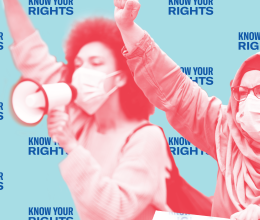LOS ANGELES - In the wake of recent homicides and riots at Los Angeles County jails, the ACLU of Southern California asked a federal judge today to establish a collaborative process involving Los Angeles County Board of Supervisors and the Sheriff's Department in order to develop and implement a strategic plan to reduce severe overcrowding and staffing shortages at Men's Central Jail.
The papers filed in the three-decade old lawsuit, requested U.S. District Judge Dean Pregerson, who was assigned to the case last year and whose first act as presiding judge was to end the practice of housing inmates on the jail floors, to conduct an unannounced tour of Men's Central Jail, the largest single jail in the United States. The request also asks Judge Pregerson to direct the county to create a sensible, long-term plan to remedy conditions endangering staff and inmates including chronic staffing shortages and overcrowding at the Downtown jail within 45 days of a status conference with the court and parties.
Legal Director Mark Rosenbaum called Men's Central Jail 'a ticking time bomb' due to conditions of gross overcrowding and understaffing whereby inmates are stacked like mice in tiny cells in a state of nearly 24-hour lockdown.'
He added, 'The bottom line is that no one is truly safe in Men's Central Jail.'
Though these conditions have been documented by the ACLU, independent monitoring entities and the county's own investigators, no comprehensive plan yet exists to assure the safety of inmates and deputies by relieving overcrowding.
'Since the riots the county and the sheriff's department have been under pressure to improve conditions and avoid another violent outbreak in the jails, but the proposals they have presented to the Board of Supervisors will not come close to solving the deeply-rooted, underlying problems in the jail,' said Jody Kent, the coordinator of the ACLU/SC jails project. 'Thus far the Sheriff has only offered band-aid solutions like releasing inmates early. We believe the court must be involved to ensure long-term, positive changes.'
In preparation of this request to the court, the ACLU/SC contracted an independent expert, Toni V. Bair, who has more than 25 years as a corrections professional including serving as a warden at a Virginia state maximum security prison.
Bair determined that inmates were so overcrowded the facility is unsafe for both jail personnel and inmates housed there:
' Staff to inmate ratios are at unsafe levels and on average are more than double the accepted national standard.
' In many cases one sheriff's deputy must monitor more than 100 inmates, which puts everyone at risk, and in some instances no deputies are available to monitor.
' Inmates are confined to spaces about a third of the size required by federal correctional standards.
' Dayrooms are being used for housing despite sheriff's deputies inability to properly monitor the scores of inmates that can be housed in the open rooms.
' Nearly all inmates are locked down upwards of 23 hours a day. Some 15 percent of inmates are denied three hours per week of federally mandated exercise time, which means they are locked down 24 hours a day.
' Bair was unable to find a single fire box that complied with policy.
' Faulty plumbing is hazardous and a serious health risk.
According to Bair's expert report he witnessed several incidents that continue to create unnecessarily dangerous conditions at Men's Central Jail:
'I observed over 100 inmates in a small room with benches...prior to their being placed in their assigned cells. This was the same room where an inmates was beaten to death in November 2005. Once again, there was no staff supervising these inmates.'
Plaintiffs have asked the court to convene a status conference, and hope that the conference will occur within the next few weeks.
The original class action lawsuit, Rutherford v. Pitchess, was filed in 1975 by the ACLU of Southern California on behalf of inmates at Los Angeles County jails challenging the constitutional inadequacy of numerous detention conditions, including the cell space provided to each inmate, visitation spaces and practices, outdoor recreation policies, indoor recreation policies, the lack of windows at MCJ, court processing policies, access to telephones, cell searches, time for meals, clothing and laundry, access to the law library, and use of excessive force by deputies.
###






